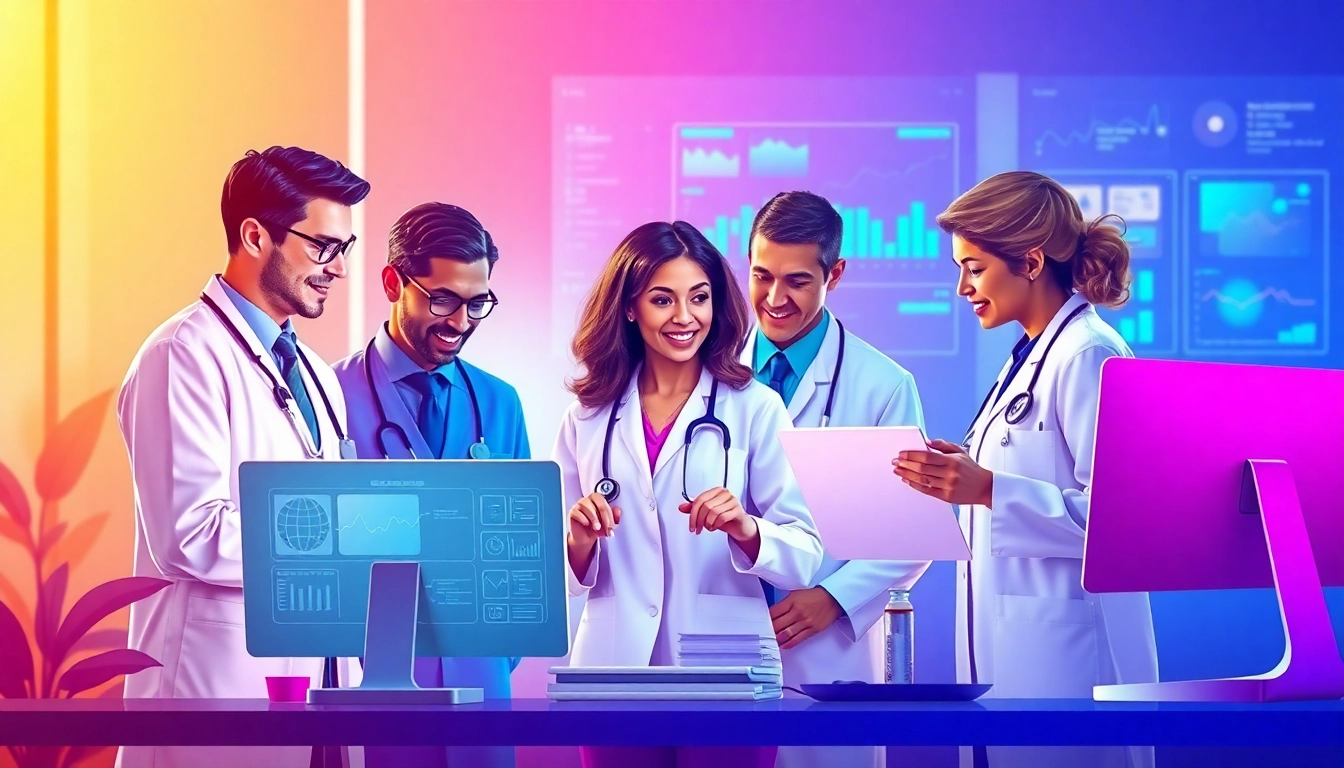Understanding Informatics in Healthcare
In the evolving landscape of healthcare, the discipline of informatics plays a pivotal role in reshaping the management and delivery of patient care. It provides health professionals with the tools and methodologies needed to harness data effectively for better health outcomes. For those seeking to delve into the depths of health informatics, resources like www.informaticsview.com offer valuable insights and guidance on this transformative field.
Defining Key Concepts of Informatics
Informatics, in a broad sense, refers to the practice of using information technology to systematically process, manage, and analyze data. Integral to this definition are several key concepts:
- Data: Raw facts and figures that can be processed or analyzed.
- Information: Data that is organized or structured in a way that it has meaning.
- Knowledge: Information that is processed by cognitive factors, gaining significance in a specific context.
In healthcare, this translates into the effective management of patient information, results, and medical histories crucial for improving clinical decision-making and patient safety.
Importance of Informatics in Modern Medicine
The importance of informatics in healthcare cannot be overstated. As medical practices increasingly rely on advanced technologies, the ability to manage and interpret health data becomes paramount.
Key benefits of informatics include:
- Enhanced Patient Care: By using electronic health records, healthcare providers can access complete patient histories, ensuring informed decisions during treatment.
- Data-Driven Decisions: Informatics systems enable providers to analyze patient outcomes and trends, leading to better healthcare policies and practices.
- Increased Efficiency: Automation of routine tasks reduces human errors and frees up healthcare professionals to focus on patient care.
Core Areas of Health Informatics
Health informatics encompasses various core areas, each contributing significantly to improved healthcare delivery:
- Clinical Informatics: Focuses on improving healthcare delivery through the effective use of patient information.
- Nursing Informatics: Merges nursing science with information management to deliver better patient care.
- Public Health Informatics: Applies informatics to public health practices, emphasizing population health data management.
Applications of Informatics in Patient Care
Electronic Health Records: Enhancing Data Management
Electronic Health Records (EHRs) demonstrate one of the most significant advancements in informatics. These digital records allow for comprehensive documentation of patient data, which enhances communication among healthcare providers.
Through EHRs, key features such as:
- Real-time data sharing across healthcare facilities
- Automated reminders for screenings and treatments
- Integrated analytics for monitoring patient outcomes
These features ensure that patient care is coordinated, comprehensive, and continuous, leading to enhanced health outcomes.
Clinical Decision Support Systems in Action
Clinical Decision Support Systems (CDSS) utilize health information technology to provide clinicians with clinical decision-making support. Examples of CDSS include:
- Diagnostic Tools: Systems that assist in diagnosing diseases based on symptoms and laboratory results.
- Medication Management: Alerts for drug interactions, appropriate dosages, and contraindications.
- Patient Safety Alerts: Notifications regarding abnormal lab results or potential adverse reactions.
By utilizing CDSS, healthcare professionals can deliver more personalized and accurate patient care, ultimately leading to improved patient outcomes.
Real-time Data Sharing for Improved Outcomes
The capacity for real-time data sharing across different healthcare systems has revolutionized patient care. This integration allows providers to access critical patient information instantly, which can be life-saving in emergency situations. Key aspects include:
- Health Information Exchange (HIE): Connects different healthcare organizations, facilitating seamless data sharing.
- Telemedicine: Incorporates remote consultations and monitoring, improving access to healthcare services.
As a result, healthcare providers are equipped to make more informed decisions faster, significantly improving health outcomes.
Challenges and Solutions in Implementing Informatics
Overcoming Data Privacy Concerns
Despite the many advantages of health informatics, data privacy remains a significant concern. With sensitive patient information being transferred across platforms, safeguarding this data is crucial. Steps to mitigate privacy issues include:
- Implementing Strong Encryption: Ensures data is safeguarded during transmission.
- Regular Audits: Conduct periodic audits to identify vulnerabilities and ensure compliance with privacy regulations.
- Training Staff: Educate staff on best practices for protecting patient information.
Integrating Systems for Seamless Operation
Integration of disparate IT systems poses challenges in achieving a seamless healthcare experience. Solutions to this issue involve:
- Adopting Interoperable Systems: These systems are designed to communicate effectively, regardless of the source.
- Standardizing Data Formats: This facilitates better data sharing across various platforms.
- Continuous Feedback Loops: Gathering feedback from users to identify integration issues promptly.
Training Healthcare Professionals Effectively
Training is critical for the successful implementation of informatics in healthcare settings. Consider these strategies:
- Hands-On Training: Provide interactive sessions where clinicians can practice using new informatics tools.
- Online Learning Modules: Offer accessible resources for ongoing education on informatics systems and updates.
- Mentorship Programs: Pair less experienced staff with informatics specialists to ensure effective knowledge transfer.
Future Trends in Health Informatics
AI and Machine Learning in Healthcare
Artificial Intelligence (AI) and machine learning are swiftly transforming healthcare practices. These technologies allow for:
- Predictive Analytics: Using historical data to predict patient outcomes and identify at-risk patients.
- Personalized Medicine: Tailoring treatment plans based on individual patient data and responses.
As these technologies become mainstream, they hold the potential to significantly enhance patient care and operational efficiency.
The Role of Telehealth and Remote Monitoring
Telehealth is changing the way healthcare is delivered, providing flexible, accessible options for patients. Key elements include:
- Remote Patient Monitoring: Utilizing devices to track patient health metrics from home.
- Virtual Consultations: Allowing healthcare providers to interact with patients in real-time, irrespective of geographic location.
This trend is particularly relevant for chronic disease management, where continuous monitoring can significantly improve patient outcomes.
Emerging Regulatory Frameworks and Standards
As health informatics continues to evolve, so too do the regulatory frameworks governing its use. Emerging standards are aimed at ensuring:
- Data Integrity: Protecting the accuracy and consistency of patient data.
- Interoperability: Developing policies that support data sharing among different systems while maintaining security.
Staying abreast of these regulations is crucial for healthcare organizations to maintain compliance while leveraging the benefits of informatics.
Resources and Career Opportunities in Informatics
Educational Paths in Health Informatics
For individuals interested in pursuing a career in health informatics, a variety of educational paths exist:
- Graduate Programs: Master’s degrees in health informatics provide advanced knowledge and are often preferred for leadership positions.
- Certification Programs: Organizations like the American Medical Informatics Association (AMIA) offer certification programs that enhance professional credentials.
Certifications and Professional Development
Certifications in health informatics can provide a competitive advantage in the job market. These include:
- Certified Health Informatician: A credential that demonstrates proficiency in informatics principles.
- Clinical Informatics Board Certification: This certification validates a physician’s expertise in applying informatics to clinical practice.
Engaging in continuous professional development through workshops and conferences is also essential for staying ahead in this dynamic field.
Job Market Trends and Salaries in the Field
The job market for health informatics professionals is rapidly expanding, driven by the increased reliance on technology in healthcare. Currently, positions such as:
- Clinical Data Analyst: Focused on interpreting complex medical data.
- Health IT Project Manager: Leading initiatives to implement new health informatics systems.
- Nurse Informaticist: Actively engaged in implementing nursing-specific data systems.
In terms of compensation, health informatics roles are well-compensated, with salaries often ranging widely based on experience, education level, and geographic location.
As healthcare continues to embrace technology, the importance of informatics will only grow, creating a wealth of opportunities for those entering or advancing in this field. By embracing these advancements, professionals can ensure they are at the forefront of healthcare innovation.



